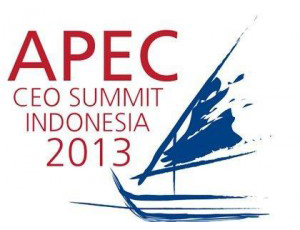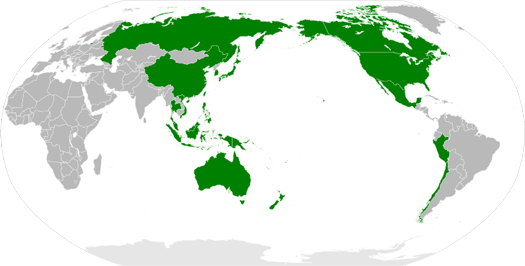The Importance of APEC to China
70% of all China trade goes through APEC members
 BALI, Oct. 7 – The annual APEC CEO Summit has been taking place in Bali, Indonesia over the past weekend, and concludes today with a Summit Keynote address by Chinese President Xi Jinping. APEC – or to give it it’s full name – the Asia-Pacific Economic Cooperation is a forum for 21 countries that seeks to promote free trade and economic cooperation throughout the Asia-Pacific region. It was established in 1989 in response to the growing interdependence of Asia-Pacific economies and the advent of regional trade blocs in other parts of the world; to fears that highly industrialized Japan (a member of the G8) would come to dominate economic activity in the region; and to establish new markets for agricultural products and raw materials beyond Europe (where demand has been declining).
BALI, Oct. 7 – The annual APEC CEO Summit has been taking place in Bali, Indonesia over the past weekend, and concludes today with a Summit Keynote address by Chinese President Xi Jinping. APEC – or to give it it’s full name – the Asia-Pacific Economic Cooperation is a forum for 21 countries that seeks to promote free trade and economic cooperation throughout the Asia-Pacific region. It was established in 1989 in response to the growing interdependence of Asia-Pacific economies and the advent of regional trade blocs in other parts of the world; to fears that highly industrialized Japan (a member of the G8) would come to dominate economic activity in the region; and to establish new markets for agricultural products and raw materials beyond Europe (where demand has been declining).
Members include Australia, Brunei, Canada, China, Indonesia, Japan, South Korea, Malaysia, New Zealand, Philippines, Singapore, Thailand, United States, Taiwan, Hong Kong, Mexico, Papua New Guinea, Chile, Peru, Russia and Vietnam. A further 12 nations have applied to join, including India, Pakistan, Bangladesh, Sri Lanka, Macau, Mongolia, Laos, Cambodia, Costa Rica, Colombia, Panama, and Ecuador. Guam has also applied to join, citing the case of Hong Kong, yet this application is contested by the United States.

APEC as it stands today covers four continents, includes nearly half of the world’s total population, 50 percent of all international trade, and accounts for some 57 percent of global GDP. APEC works to raise living standards and education levels through sustainable economic growth and to foster a sense of community and an appreciation of shared interests among Asia-Pacific countries.
The annual APEC Economic Leaders’ Meeting is attended by the heads of government of all APEC members, while the location of the meeting rotates annually among the member economies. It represents both a trade forum encompassing much of East Asia, plus the Western coasts of North and South America. While the APEC meetings are largely trade based, the Summit also provides a platform for global leaders to meet unofficially ‘on the sidelines’ and discuss other bilateral matters or other issues of global importance, while in a less official and yet more private setting. The meetings are open to selected business leaders as well as government ministers, however is strictly by invitation only.
In terms of China, APEC is a massive deal. Joining in 1991, according to China’s Ministry of Commerce, the country’s collective trade with other APEC members accounts for close to 70 percent of all of China’s global trade. APEC therefore has become and remains China’s single most important trade membership after the World Trade Organization.
Since it joined, China has reduced its general tariff rates for imported goods from APEC members from nearly 40 percent in 1991 to 9.8 percent by the end of 2010. In addition to this, China created a US$10 million “APEC cooperation fund” to encourage and support Chinese enterprises to participate in APEC economic and technical cooperation, including education for Chinese companies looking to develop business and invest in other APEC nations.
The benefit of APEC membership has been mainly to sweep away protectionism in markets and to reduce tariffs. In 1989, when APEC was first formed, regional trade tariffs stood at an average 16.6 percent on all goods. By 2004, these had reduced to an average 5.5 percent, and more products are still being added to this list. Today, however, certain other criteria come into play, often with environmental considerations. At the current APEC Summit for example, Indonesia and Malaysia have been lobbying to have import duties on palm oil and rubber reduced. Both are key manufacturing pillars of each country’s economy. Yet APEC members will only reduce these tariffs if the source of these products can be shown to have come from land that was not originally rain forest. Indonesia and Malaysia have been heavily criticized in the past – and especially by Singapore – for burning thousands of hectares of jungle every year to re-use the land for these crops. The use of tax incentives and tariffs to encourage a greener source of products has been a major driver among APEC members in recent years.
APEC’s secretariat is based in Singapore. Following this Bali meeting, next year’s APEC CEO Summit will take place in Beijing. This will be followed by APEC 2015 in Manila, Philippines and in 2016 in Lima, Peru.
Chris Devonshire-Ellis, Founding Partner of Dezan Shira & Associates, has been attending the APEC CEO Summit these past few days. His reports, commentary and opinions on APEC developments thus far are already online and can be found exclusively on our Asia Briefing website. These include comments about the non-participation of U.S. President Barack Obama, the request by India to join APEC, underlying concerns over the Spratly Islands, as well as the decision made to re-start the Doha Round of talks concerning global trade and agriculture.
Today’s report from Chris in Bali discusses which way the Asian winds are blowing, which examines the creation of a 1.75 billion population of Asian middle class by 2020, the rise of China and what this means for the United States and Japanese influence and thinking in Asia and beyond.
Chris’ summary of the APEC discussions with U.S. Secretary of State John Kerry, a round table with President Vladimir Putin of Russia, and Chinese President Xi Jinping’s Keynote Address to be made this afternoon can all be read on the Asia Briefing website later this evening.
2013 APEC CEO Statistics
- 68 percent expected to increase business investments in 2014, with China, Indonesia and the United States as the top three destinations over the next three-five years.
- 42 percent of CEOs are “very confident” in revenue growth in the forthcoming year.
- 49 percent of CEOs say public-private infrastructure models are important for corporate growth.
- CEOs think China, the United States and Singapore as the economies most adaptable to change.
- CEOs think Indonesia, Myanmar and China are the economies that could surpise us in the coming year.
- 87 percent of CEOs say middle income consumers have the most influence on their growth strategies
- 22 percent of CEOs now make corporate purchases via mobile phone.
SUBSCRIBE TO ASIA BRIEFING
Subscription to Asia Briefing is free, and includes our complimentary weekly Asian business and investment news round-up, as well as our China Briefing, India Briefing, ASEAN Briefing and Vietnam Briefing news and commentary. Subscription includes complimentary PDF copies of each of our regular monthly and quarterly magazines, plus special deals on all Asia Briefing publications and events.
Please click here to complete your Asia Briefing subscription and receive our complimentary email update every Thursday.
Chris Devonshire-Ellis is the Founding Partner of Dezan Shira & Associates and is currently attending the APEC CEO Summit. He will be reporting on discussions and speeches made at the event exclusively on Asia Briefing over the coming days.
Related Reading
 Are You Ready for ASEAN 2015?
Are You Ready for ASEAN 2015?
ASEAN integration in 2015, and the free trade agreements China has signed with ASEAN and its members states, will change the nature of China and Asia focused manufacturing and exports. In this important issue of Asia Briefing we discuss these developments and how they will impact upon China and the global supply chain.
 Expanding Your China Business to India and Vietnam
Expanding Your China Business to India and Vietnam
This issue of Asia Briefing Magazine discusses why China is no longer the only solution for export driven businesses, and how the evolution of trade in Asia is determining that locations such as Vietnam and India represent competitive alternatives. With that in mind, we examine the common purposes as well as the pros and cons of the various market entry vehicles available for foreign investors interested in Vietnam and India.
 An Introduction to Tax Treaties Throughout Asia
An Introduction to Tax Treaties Throughout Asia
In this issue of Asia Briefing Magazine, we take a look at the various types of trade and tax treaties that exist between Asian nations. These include bilateral investment treaties, double taxation agreements, and free trade agreements – all of which directly affect businesses operating in Asia.
 An Introduction to Development Zones Across Asia
An Introduction to Development Zones Across Asia
In this issue of Asia Briefing Magazine, we break down the various types of development zones available in China, India and Vietnam specifically, as well as their key characteristics and leading advantages.
 Work Visa and Permit Procedures Across Asia
Work Visa and Permit Procedures Across Asia
In this edition of Asia Briefing Magazine, we outline the specific documents required for foreign nationals working in China, India, Indonesia, Malaysia, Philippines, Singapore, Thailand and Vietnam, as well as highlight the relevant application processes in each of these countries.
- Previous Article Chris Devonshire-Ellis at APEC – Exclusively on Asia Briefing
- Next Article Record-Filing Measures for Foreign Investment in Shanghai Free Trade Zone









